Allergies in dogs can be a challenging journey for any pet owner. Without specific, often expensive, veterinary tests, pinpointing the exact allergen that triggers your dog’s discomfort can feel like a guessing game. Typically, working closely with your vet, an elimination diet is the most effective approach to identify the culprits. If you suspect dietary triggers, the search for the Best Hypoallergenic Dog Food Uk Reviews becomes paramount. The primary solutions generally fall into two categories: limited ingredient diets or specially formulated hypoallergenic foods designed to neutralise common allergens.
Limited ingredient dog foods are precisely what they sound like – made with a minimal number of ingredients, making it easier to identify and rule out potential triggers. Hypoallergenic dog foods, on the other hand, often feature hydrolysed (broken down) proteins. These proteins are so small that the dog’s immune system doesn’t recognise them as a threat, thus preventing an allergic reaction. For many owners in the UK, the most practical and affordable starting point is an elimination diet, followed by selecting a hypoallergenic food based on proteins your dog can tolerate.
Understanding Dog Allergies: Signs, Causes, and Diagnosis
Canine allergies are immune system overreactions to otherwise harmless substances. These reactions can manifest in various ways, making them tricky to diagnose without a structured approach. Understanding the symptoms and working with your vet is crucial to improving your dog’s quality of life.
Common Allergy Symptoms in Dogs
Allergic reactions in dogs can present a wide range of signs, affecting various parts of the body. Recognising these symptoms early can help you seek appropriate veterinary advice. Common indications of an allergy might include:
- Skin issues: Persistent itching, redness, inflammation, hot spots, hair loss, or recurrent ear infections. This is often the most common manifestation, sometimes requiring an [itch reliever for dogs].
- Gastrointestinal problems: Chronic diarrhoea, vomiting, excessive gas, or changes in appetite.
- Respiratory symptoms: Sneezing, coughing, wheezing, or watery eyes.
- Paw chewing/licking: Often a sign of irritation or itchiness.
Identifying Common Canine Allergens
The list of potential allergens for dogs is extensive, but some ingredients are more commonly implicated in adverse food reactions. These often include various meats, such as beef, chicken, lamb, pork, rabbit, and fish. Beyond proteins, common allergens also extend to grains like wheat and corn, as well as eggs, dairy products, and soy. Many commercial dog foods are now specifically labelled as being free from some of these ingredients, catering to the growing need for sensitive diets.
The Role of a Veterinary Professional in Diagnosis
It’s vital to stress that diagnosing a food allergy should always involve a veterinary professional. While you might suspect certain triggers, a vet can guide you through a proper elimination diet. This process typically involves feeding your dog a novel protein or hydrolysed diet for an extended period (8-12 weeks) to see if symptoms resolve, then gradually reintroducing ingredients to pinpoint the specific allergen. Attempting to self-diagnose can lead to nutritional imbalances or prolong your dog’s discomfort.
What is Hypoallergenic Dog Food?
Hypoallergenic dog food is specifically formulated to minimise the risk of allergic reactions. These diets are carefully crafted, focusing on either limited ingredients or specially processed proteins to avoid triggering the immune system.
Limited Ingredient Diets (LIDs) vs. Hydrolysed Protein Diets
- Limited Ingredient Diets (LIDs): These foods contain a restricted number of ingredients, often featuring a single novel protein source (e.g., duck, venison, salmon) and a single carbohydrate source (e.g., sweet potato, pea). The simplicity of LIDs makes it easier to track and eliminate potential allergens during an elimination trial.
- Hydrolysed Protein Diets: These diets take common protein sources (like soy or chicken) and break them down into very small molecular fragments. These fragments are too small for the dog’s immune system to recognise as an allergen, thus preventing a reaction. These are often prescription diets and are highly effective for severe allergies.
How Hypoallergenic Formulas Work
The principle behind hypoallergenic formulas is to bypass or disarm the immune system’s allergic response. By using novel proteins your dog hasn’t encountered before, or by hydrolysing common proteins, the body doesn’t launch an inflammatory attack. Many of these diets also include beneficial ingredients like omega-3 fatty acids to support skin health and reduce inflammation, and prebiotics/probiotics to aid digestive health.
Benefits Beyond Allergies
While primarily designed for dogs with allergies, hypoallergenic diets can also be highly beneficial for dogs with other sensitive conditions. They are often easily digestible, making them suitable for dogs with sensitive stomachs, inflammatory bowel disease (IBD), exocrine pancreatic insufficiency (EPI), or small intestinal bacterial overgrowth (SIBO).
Key Considerations When Choosing Hypoallergenic Dog Food
Selecting the right hypoallergenic food involves more than just picking a product off the shelf. Consider these factors to ensure you make the best choice for your dog.
- Protein Sources: Look for single, novel protein sources in LIDs or ensure hydrolysed proteins are used. Avoid common allergens if you’ve identified them.
- Grain-Free Options: Many dogs with allergies also react to grains like wheat and corn. A grain-free formula can be a good option, though grains themselves are not always the primary allergen.
- Type of Food: Hypoallergenic options are available in [wet dog food], [dry dog food], or [raw dog food] formats. Your dog’s preference and your lifestyle will dictate the best type.
- Veterinary Recommendation: Always consult your vet. Many genuinely hypoallergenic foods are prescription-only or best used under veterinary guidance, especially for elimination diets.
Top Hypoallergenic Dog Food UK Reviews
Here, we review some of the leading hypoallergenic dog food options available in the UK, helping you make an informed decision for your sensitive canine companion.
Royal Canin Hypoallergenic
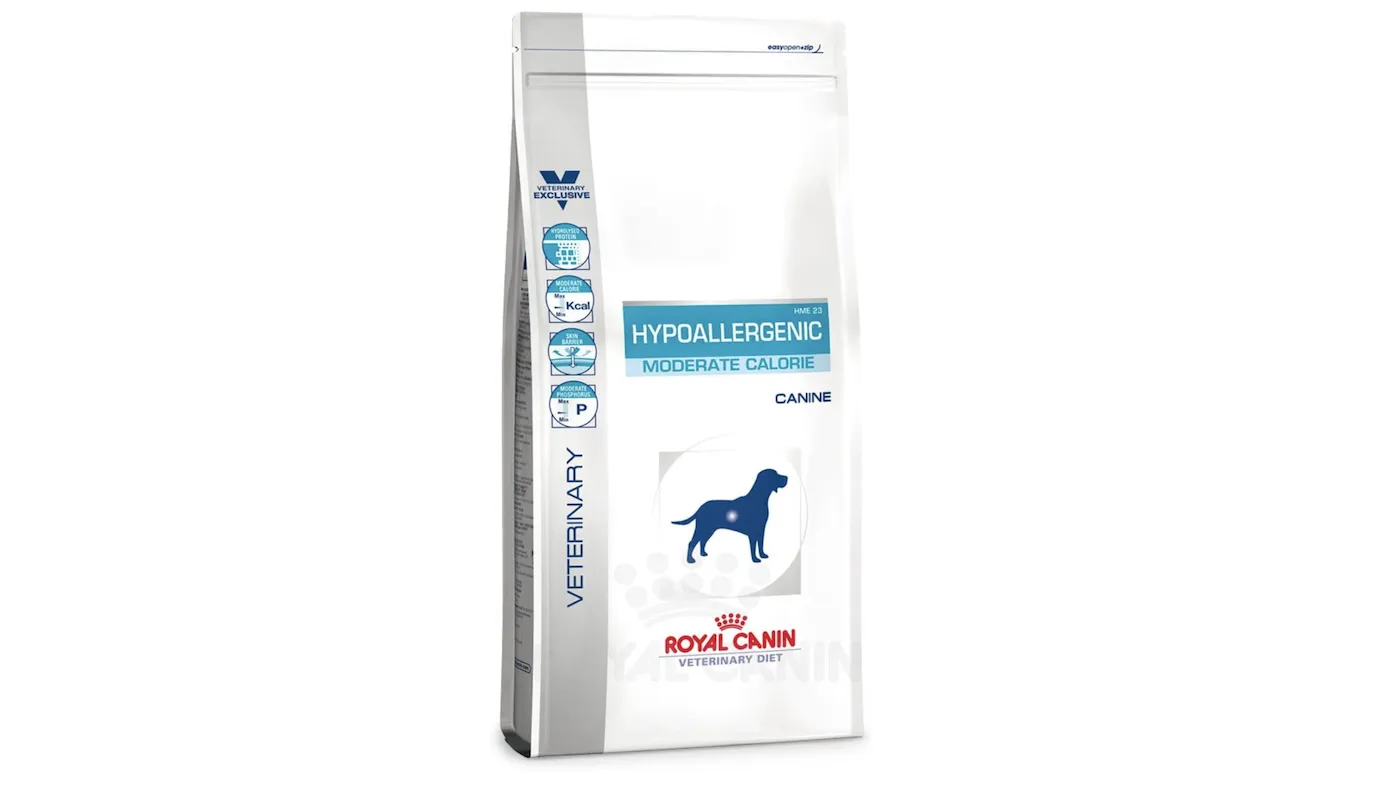 Royal Canin Hypoallergenic dry dog food for sensitive canines
Royal Canin Hypoallergenic dry dog food for sensitive canines
Options: Adult, adult moderate calorie or adult small dog | Type: Dry food | Sizes: 2kg, 7kg or 14kg | RRP: From £19.49
Royal Canin’s Hypoallergenic formula is a highly recommended veterinary diet, formulated specifically to help reduce ingredient and nutrient intolerances. It uses selected sources of hydrolysed soya protein isolate with a low molecular weight, ensuring the protein is broken down sufficiently to not trigger an immune response. This diet also includes a complex of nutrients to support the skin’s natural protective barrier, along with specific Omega-3 long-chain fatty acids beneficial for both digestive health and skin condition.
This food is suitable for dogs over 12 months with Adverse Food Reactions (AFR) presenting dermatologic and/or gastrointestinal signs, and is ideal for food elimination trials and long-term management. It’s also beneficial for Atopic Dermatitis (CAD) associated with AFR, chronic pruritus, chronic diarrhoea, Inflammatory Bowel Disease (IBD), Exocrine Pancreatic Insufficiency (EPI), and Small Intestinal Bacterial Overgrowth (SIBO). However, it is not suitable for dogs with pancreatitis, or during gestation/lactation. This formula is [also available as wet food], and Royal Canin offers a Dermacomfort food specifically for dogs prone to skin irritation and itching, utilising a “reduced allergen formula.”
In the UK? View now at amazon.co.uk, viovet.co.uk or petsathome.com
Harringtons Just 6
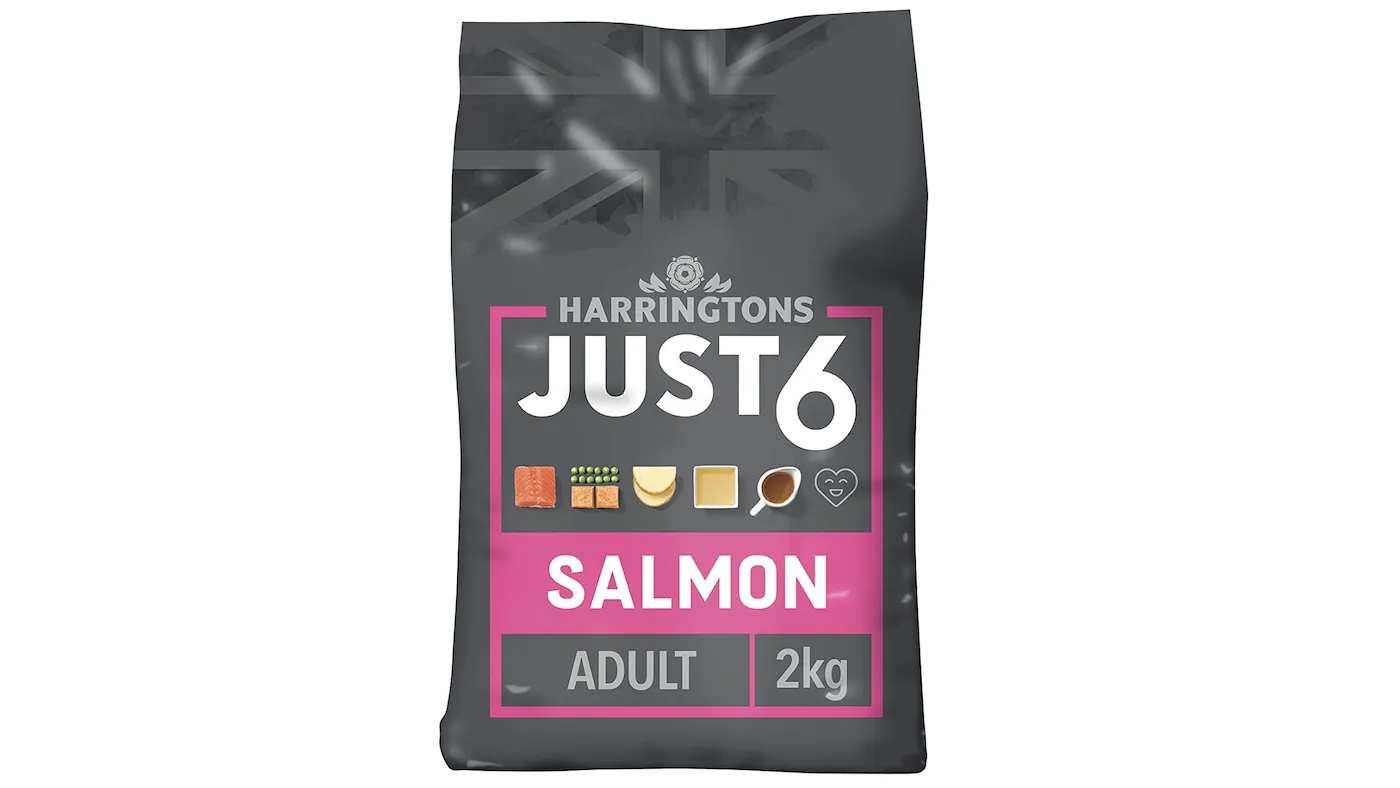 Harringtons Just 6 limited ingredient dry dog food bag
Harringtons Just 6 limited ingredient dry dog food bag
Options: Salmon, chicken or lamb | Type: Dry food | Sizes: 2kg, 6kg or 12kg | RRP: £11 for 2kg
Harringtons Just 6 is a prime example of a limited ingredient diet, featuring just six simple, recognisable ingredients. Each variant uses a single protein source, carefully blended with farm-grown vegetables and beneficial oils rich in vitamins and minerals to create a wholesome, healthy food. For instance, the salmon kibble is crafted with salmon, vegetables, rapeseed oil, vegetable stock, and a comprehensive vitamin and mineral supplement.
The food is slow-baked, a process that helps retain a significantly higher nutritional content compared to other common cooking methods. This is a grain-free, hypoallergenic dog food, making it an excellent choice for dogs with sensitivities to common grains. It is [also available as wet food].
In the UK? View now at amazon.co.uk, viovet.co.uk or petsathome.com
Naturediet Feel Good
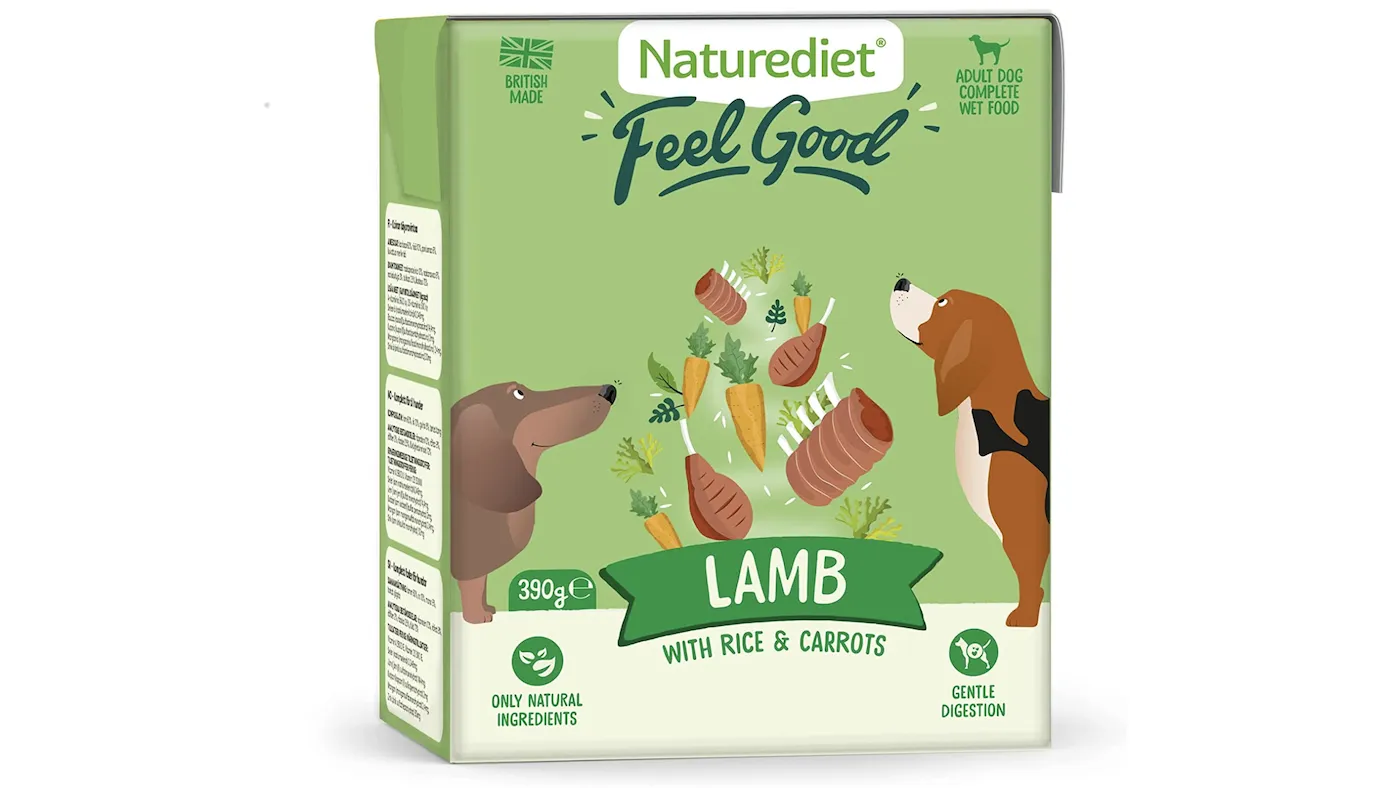 Naturediet Feel Good natural wet dog food for sensitive stomachs
Naturediet Feel Good natural wet dog food for sensitive stomachs
Options: Lamb, chicken, chicken/lamb, fish, puppy, salmon, turkey/chicken, or senior lite | Type: Wet food | Sizes: 18 x 390g | RRP: £25.20
Naturediet Feel Good offers a hypoallergenic, complete, and nutritionally balanced natural wet dog food. Its recipes utilise 100% natural ingredients to provide a gentle and nourishing diet, making it an excellent choice for fussy eaters or dogs with sensitive tummies.
A typical meal composition, for example, includes 60% lamb, 10% rice, 6% carrot, natural ground bone, and dried seaweed. These recipes are free from processed meats, added sugars, artificial colours, flavours, or preservatives, as well as common fillers like cereals. Notably, this product is also free from beef and beef by-products, addressing another common allergen. The ingredients are gently steam-cooked with a small amount of water to preserve nutrients. Grain-free options are also available within the range.
In the UK? View now at amazon.co.uk, viovet.co.uk or petsathome.com
Wilsons Premium Raw Dog Food
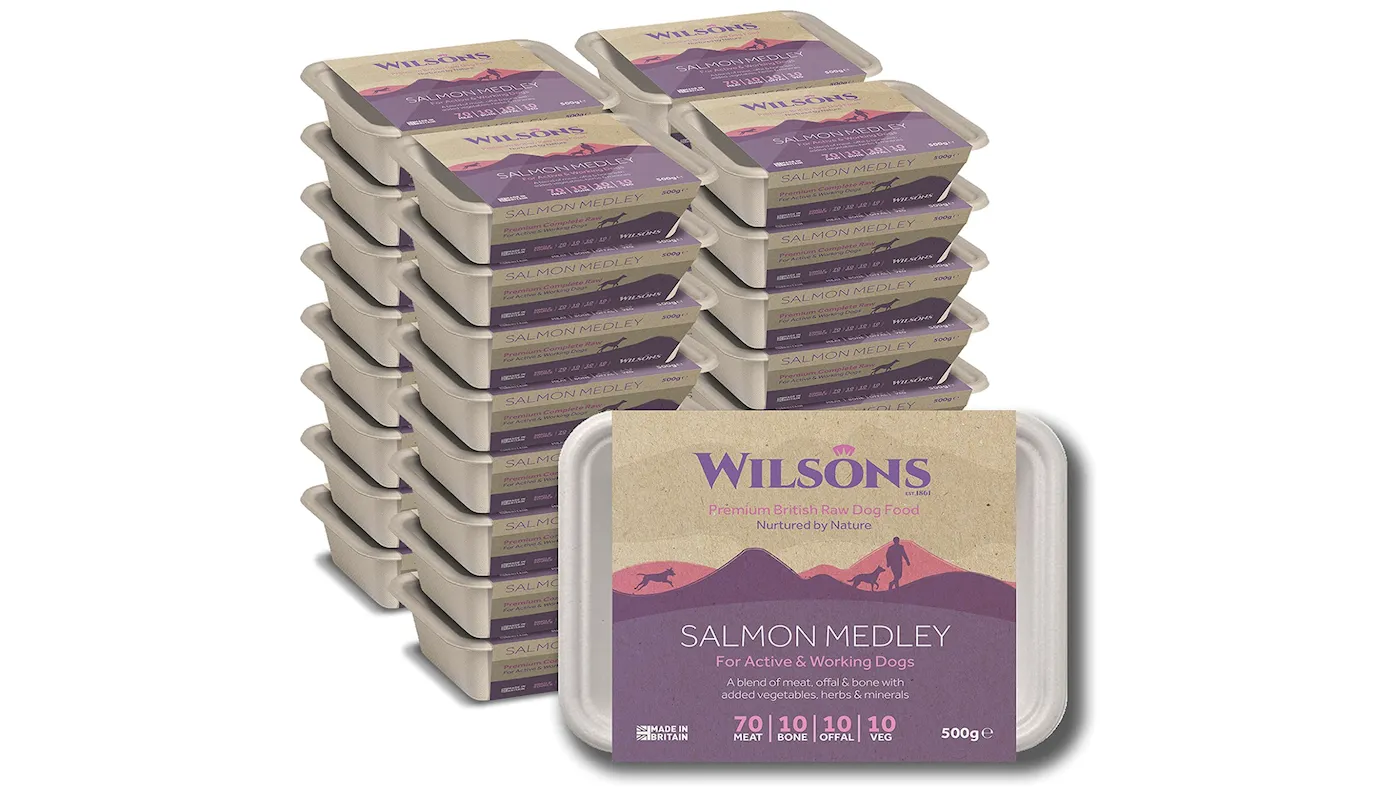 Wilsons Premium Raw hypoallergenic dog food tubs
Wilsons Premium Raw hypoallergenic dog food tubs
Options: Turkey dinner, beef hot pot, chicken casserole, lamb tagine, salmon medley, steak/kidney or variety | Type: Raw food | Sizes: 500g, 8kg (16 pack), 12kg (24 pack) or 16kg (32 pack) | RRP: £2.99 for 500g
For owners considering a raw diet for sensitive dogs, Wilsons Premium Raw Dog Food offers single-source protein, hypoallergenic, and grain-free recipes. These meals are produced using high-quality, locally sourced ingredients and are minimally processed to retain natural goodness. Each nutritionally complete meal follows a 70-10-10-10 mix of meat, bone, offal, and vegetables, providing a well-rounded diet intended to improve fur, skin, digestion, and overall health.
While raw diets can be beneficial due to their natural ingredients and lack of additives, it’s crucial to consult your vet before transitioning, especially for sensitive dogs, as some may not thrive on a raw diet. The meals are conveniently packaged in 500g tubs and available in larger bundles of 8kg, 12kg, or 16kg.
In the UK? View now at amazon.co.uk or petsandfriends.co.uk
Purina Pro Plan Veterinary Diet Hypoallergenic
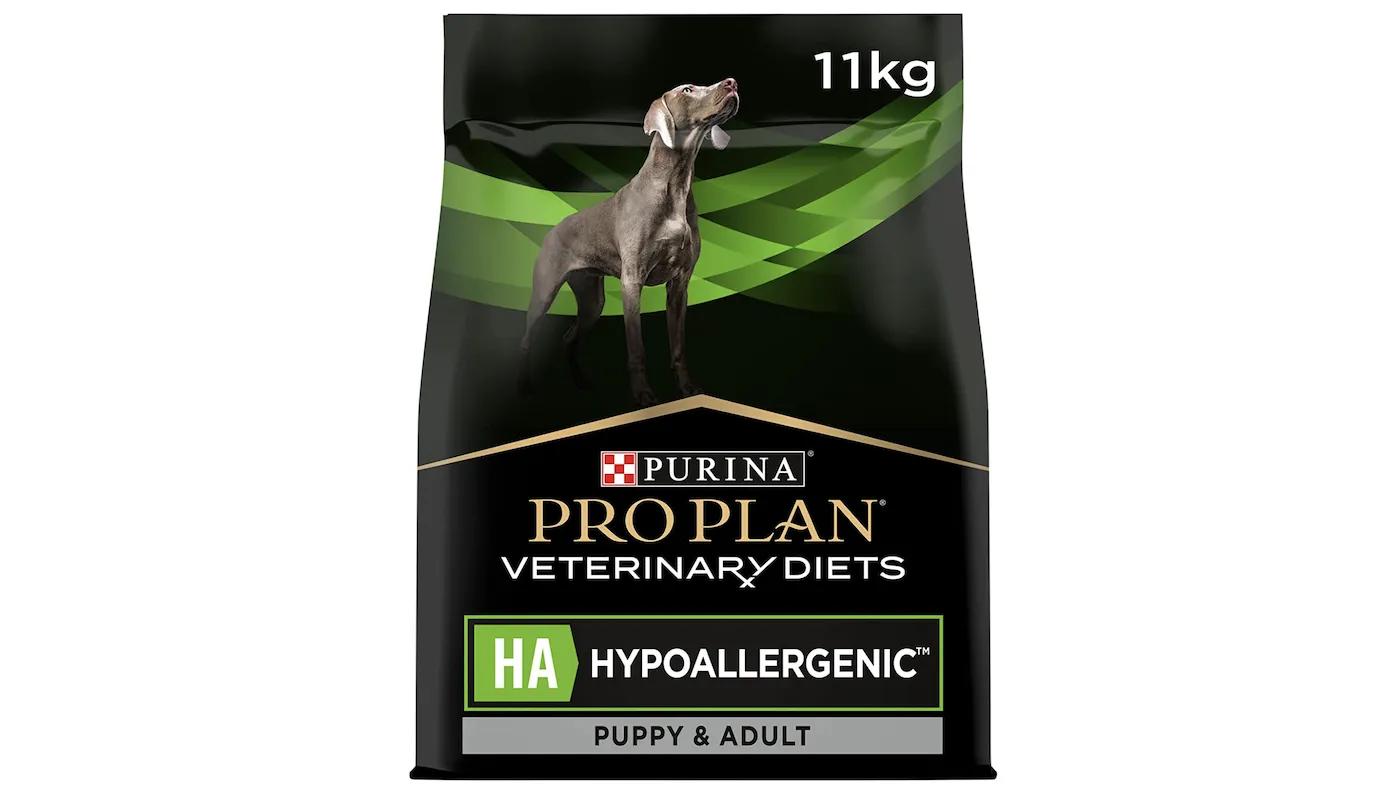 Purina Pro Plan Veterinary Diet HA Hypoallergenic dry dog food
Purina Pro Plan Veterinary Diet HA Hypoallergenic dry dog food
Type: Dry food | Sizes: 3kg or 11kg | RRP: From £25 for 3kg
Purina Pro Plan Veterinary Diets are designed to address a range of canine health issues, and their Hypoallergenic formula is a testament to this specialisation. This diet is formulated with a single, hydrolysed soya protein of low molecular weight, combined with purified carbohydrate sources to effectively minimise the risk of allergic responses. It is also enriched with omega-3 fatty acids, which play a crucial role in maximising the body’s natural anti-inflammatory processes.
This food is specifically intended for pets with particular health conditions and is commonly used during elimination diet trials to aid in the diagnosis of food allergies. Its high digestibility also makes it particularly beneficial for dogs suffering from severe bowel disease. As a veterinary diet, its use should always be under the direct supervision of a veterinary professional.
In the UK? View now at amazon.co.uk, viovet.co.uk or petsathome.com
Billy + Margot Superfood Single Animal Protein
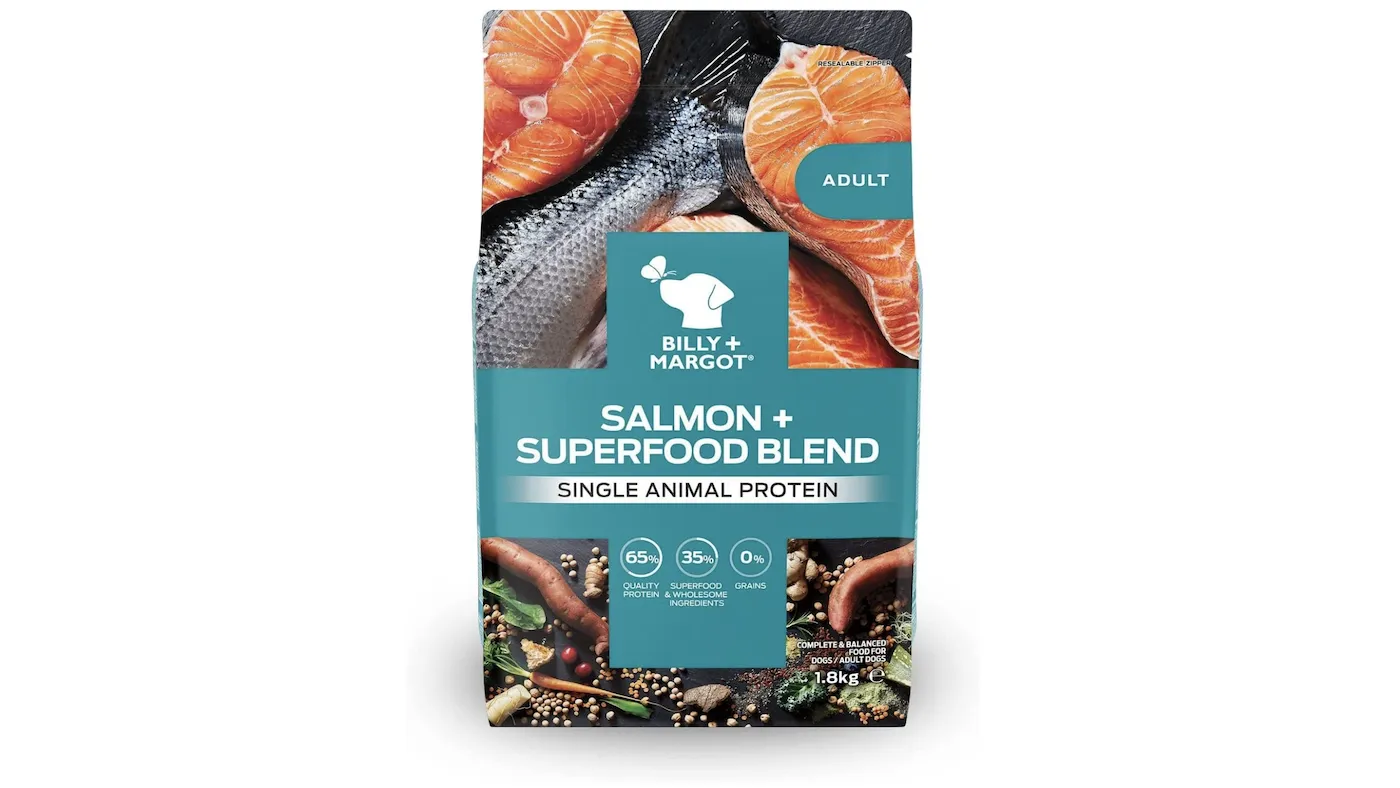 Billy + Margot Superfood Single Animal Protein dry dog food with salmon
Billy + Margot Superfood Single Animal Protein dry dog food with salmon
Options: Salmon, lamb or chicken | Type: Dry food | Sizes: 1.8kg, 4.5kg or 9kg | RRP: From £18.50 for 1.8kg
Created by renowned canine nutritionist Marie Jones, Billy + Margot Superfood Single Animal Protein offers a unique blend of high-quality, freshly cooked meat and natural, vitamin-rich ingredients. This diet is expertly balanced and nutritionally complete, featuring 65% of a single protein (e.g., salmon) alongside 35% superfoods and holistic ingredients such as alfalfa, coconut oil, and Manuka honey.
It is formulated to be grain-free and dairy-free, with no artificial chemicals or additives, making it an excellent option for dogs with sensitive digestion or those suffering from allergies, gluten intolerance, wheat allergies, or chemical sensitivities leading to issues like itchiness, hair loss, sore skin, and hot spots. This food is [also available as wet food].
In the UK? View at amazon.co.uk, viovet.co.uk, petsandfriends.co.uk or petsathome.com
Transitioning Your Dog to a New Diet
When introducing any new food, especially a hypoallergenic one, it’s crucial to do so gradually to avoid upsetting your dog’s digestive system. Over 7-10 days, slowly mix increasing amounts of the new food with decreasing amounts of their old food. Monitor your dog for any signs of discomfort or changes in stool consistency. Patience is key, especially when you are trying to observe improvements in allergy symptoms.
Conclusion
Navigating the world of dog allergies and finding the best hypoallergenic dog food UK reviews can be overwhelming, but with the right information and professional guidance, you can significantly improve your dog’s health and comfort. Remember that diagnosing a food allergy and selecting the most appropriate diet should always involve a consultation with your veterinarian. They can provide tailored advice and support through elimination trials to ensure your furry friend thrives. By choosing a high-quality, vet-recommended hypoallergenic diet, you’re taking a vital step towards a happier, healthier life for your sensitive canine companion.
For more insights into canine health and nutrition, explore other articles on Dog Care Story.
